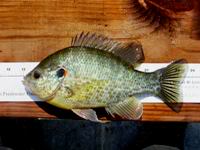|
Forums36
Topics41,027
Posts558,631
Members18,544
| |
Most Online3,612
Jan 10th, 2023
|
|
|
9 members (Boondoggle, Pat Williamson, SCFarms, Bill Cody, Bigtrh24, Fishingadventure, John Fitzgerald, catscratch, Dave Davidson1),
696
guests, and
330
robots. |
|
Key:
Admin,
Global Mod,
Mod
|
|
|
|
Joined: Mar 2005
Posts: 21,517 Likes: 272
Moderator Hall of Fame 2014  Lunker
|

Moderator Hall of Fame 2014  Lunker
Joined: Mar 2005
Posts: 21,517 Likes: 272 |
Bob I will check Fisheries 2nd tonight and reply. It has a chapter on acoustics in fisheries.
My observation is it does no harm. However I have no doubt that fish can be conditioned to avoid sonar. If , in a pond , they are caught under sonar repeatedly they will become conditioned to avoid it as a negative stimulus.
This study ison its way.
Transactions of the American Fisheries Society
Induced Aggregation of Pond-Reared Rainbow Trout (Salmo gairdneri) Through Acoustic Conditioning
ROBERT RILEY ABBOTT
Fisheries Research Institute, College of Fisheries, University of Washington, Seattle, Washington
Abstract.—About 90% of the rainbow trout (Salmo gairdneri) roaming freely in a large pond were conditioned to come to feed at the source of an underwater acoustic stimulus in about 45 trials. The stimulus was a 150-Hz, pure tone broadcasted continuously for one minute before and throughout feeding. The fish showed no tendency to discriminate between the conditioning tone and a 300-Hz tone produced in tests from the same sound source.
DOI: 10.1577/1548-8659(1972)101<35:IAOPRT>2.0.CO;2
Transactions of the American Fisheries Society 1972;101:35–43
It is clear that the fish detected an
acoustic phenomenon because of the startle
reaction on presentation of the acoustic stim-
ulus. It is also clear that some, if not all, of
the fish were conditioned to come to the
acoustic source. It may be argued that some
fish were conditioned to come to the acoustic
source, but that the rest were conditioned to
come to the feeding area when the other fish
exhibited a startle reaction. This possibility
seems unlikely; it is more likely that the be-
havior of the fast learners facilitated condi-
tioning of the rest."
Last edited by ewest; 08/19/08 09:11 AM.
.gif) 
|
|
|
Moderated by Bill Cody, Bruce Condello, catmandoo, Chris Steelman, Dave Davidson1, esshup, ewest, FireIsHot, Omaha, Sunil, teehjaeh57
|
There are no members with birthdays on this day. |
|
|
|